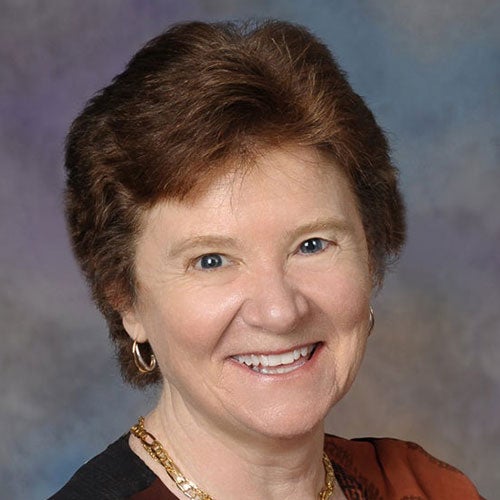
-
2104 Winslow Building
- dlm@cs.rpi.edu
-
518-276-4404
- 0000-0001-7037-4567
About
Deborah McGuinness is a leading expert in knowledge representation and reasoning languages and systems and has worked in ontology creation and evolution environments for over 20 years. Most recently, McGuinness is best known for her leadership role in semantic web research, and for her work on explanation, trust, and applications of semantic web technology, particularly for scientific applications.
“I am interested in making smart systems that help people and machines function better,” said McGuinness. “My slant on this work is to research, develop, and use semantic technologies that allow people and machines to represent, reason with, visualize, and explain information in ways that support understanding and (re)use. My application areas cover a wide range of domain areas, but often in earth and space science informatics and health informatics.”
B.S. Computer Science, Duke University, 1980
B.A. Mathematics with Highest Honors, Duke University, 1980
M.S. Computer Science, University of California, Berkeley, 1981
Ph.D. Knowledge Representation, Rutgers University, 1997
Research
Professor McGuinness's main research thrusts are in languages, tools, and environments for the semantic web. Deborah led the Stanford Inference Web (IW) effort. Inference Web provides a framework for increasing trust in answers from heterogeneous systems by explaining how the answers were derived and what they depended on. Inference Web supports this goal by providing infrastructure and an implemented web-based environment for storing, exchanging, combining, annotating, comparing, search for, validating, and rendering proofs and proof fragments provided by reasoners and query answering systems.
McGuinness is co-editor of the Ontology Web Language which has emerged from web ontology working group of the World Wide Web (W3C) semantic web activity and has now achieved W3C Recommendation status. She helped start the web ontology working group out of work as a co-author of the DARPA Agent Markup Language program's DAML language. She helped form the Joint EU/US Agent Markup Language Committee which evolved the DAML language into the oil-reference DAML OIL description logic-based ontology language. She is a co-author of one of the more widely used long-lived description logic systems (CLASSIC) from Bell Laboratories. Her work on languages (including OWL, oil-reference.html DAML OIL, OIL, CLASSIC, etc.) is aimed at providing languages that enable the next generation of web applications moving from a web aimed at human consumption to the semantic web aimed at machine consumption in support of intelligent assistants and web agents. Deborah is a leader in ontology-based tools and applications. She is a co-author and technical leader of the Stanford KSL ontology evolution environment. She also consulted to help VerticalNet design and build its Ontobuilder/Ontoserver ontology evolution environment. She also provided technical leadership for the Stanford project to help Cisco systems form its ontology evolution plan for its meta data formation work.
Ontologies, Semantic Web, Knowledge Graphs, Linked Open Data, Semantic eScience, Health and Life Science Informatics, Environmental Informatics
Teaching
Advanced Semantic Web
This course aims at showing the cutting-edge research on semantic web and encouraging research capability for advanced students. Students attending this course should expect reading, presenting and evaluating important research papers on semantic web, identifying and surveying interesting semantic web research areas.
Emerging Trends in Semantic Technology
This is a seminar course — not a lecture course — that will discuss emerging trends in semantic technologies. We will have many presentations and discussions throughout the course that help you to understand, conduct, and evaluate academic research while we discuss the emerging trends in semantic technologies.
Ontology Engineering
This course provides an introduction to ontologies, their uses, and an overview of their application in semantically enabled systems.
Goals: To learn how to build computer understandable definitions of terms for usage in automated systems.
Semantic eScience
As semantic technologies have been gaining momentum in various e-Science areas, it is important to offer semantic-based methodologies, tools, middleware to facilitate scientific knowledge modeling, logical-based hypothesis checking, semantic data integration and application composition, integrated knowledge discovery and data analyzing for different e-Science applications.
Goals: To fill the gaps that are currently present in the integrative nature of informatics for the translation of science into requirements for the underlying and largely syntactic e-infrastructure.
Topics in Knowledge Graphs
Prepares students for research in knowledge graphs.
Recognition
Deborah has been recognized with awards as a fellow of the American Association for the Advancement of Science (AAAS) for contributions to the Semantic Web, knowledge representation, and reasoning environments and as the recipient of the Robert Engelmore award from the Association for the Advancement of Artificial Intelligencehe (AAAI) for leadership in Semantic Web research and in bridging Artificial Intelligence (AI) and eScience, significant contributions to deployed AI applications, and extensive service to the AI community. Deborah has also received a Lifetime Achievement award from the Knowledge Graph Conference Series for "Outstanding contribution to the field of knowledge engineering".
Publications
The following is a selection of recent publications in Scopus. Deborah McGuinness has 240 indexed publications in the subjects of Computer Science, Mathematics, Engineering.